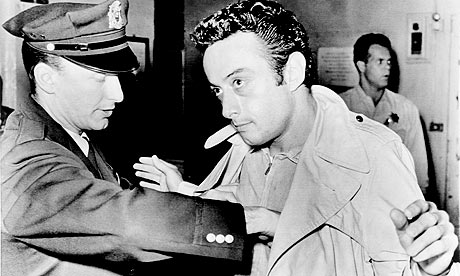There is a great Jewish legend about a shoe maker who comes to the rabbi and asked if he can learn Talmud. The rabbi says to the shoe maker, “To study Talmud, you must think like a scholar.” He then proceeds to share a story.
“Two criminals break into a house through the chimney. When they climb out of the fireplace, one of them has shmutz all over his face.” The rabbi then asks the shoe maker, “Which one washes his face?”
To this, the shoe maker quickly replies, “The one with the shmutz.”
“You see,” says the rabbi, “you are not thinking like a Talmud scholar.”
At that moment, a light bulb goes off in the shoe makers head and he replies smugly, “I get it! The one with the shmutz sees the one with the clean face and can’t imagine himself being dirty, but the one who sees his partner with the dirty face must imagine the same about himself, so he washes his face.”
“Oy!” Says the rabbi. “Did you really believe that a man can slide down a chimney and not get shmutz on his face?”
I love this story because it helps illustrate the most important things about being Jewish; one was the title of an Apple computer advertising campaign several years ago, the other the profound message of my hero Lenny Bruce.
Years before the iPad and iPhone, when Apple wasn’t the wealthiest company in the world, and their market share was not what it is today, they tried appealing to the fringes by asking us to “Think different.” Judaism has had a monopoly on this simple command as far back as Abraham. In a world of pagans, in a world where people are willing to trust their morality to statues and a plethora of Gods, Jews said, “Think different!” and brought us Elohim, one God, to help avoid the possibility of dissonant sources of morality.
When you think about it, “Think different!” is an amazing request. It asks us to not settle for the status quo, to not be happy with the easy answers, to not get stuck in our old routines. “Think different!” is our way of saying, we are a people of hope, a people of possibility, a people who can repair the world; all we have to do is put our minds to it.
The message of Lenny Bruce is truly more profound. It says, be irreverent. Don’t respect holy cows. Fight the power! Don’t believe everything you hear.
Lenny lived his Torah. When the police started arresting him for “obscenity” in his performances, He didn’t censor himself. He turned to his friend, the great comedian Steve Allen, and asked for a meeting with his father in-law, a missionary reverend. He wanted to understand why talking about “the first commandment God gives in the Bible, ‘be fruitful and multiply,’ is obscene.” He couldn’t understand the hypocrisy of his puritanical accusers. The same is true of our rabbis. When they were confronted by the Bat Kol, the voice of God, who told them that they were wrong and the lone Rabbi Eliezer was right, in a matter about the kashrut, the kosherness, of an oven, the rabbis refused to capitulate. They declared, “[The Torah is] not in heaven.” It isn’t God’s anymore. It’s theirs. Ours. And we must determine how we understand it. This is also the irreverence of Rabban Yochanan ben Zakai who, when asked what to do if the Mashiach comes while people are planting trees, said, “finish planting the trees and then go greet the Messiah.”
Every second day of Rosh Hashana, I miss the irreverence of Abraham who had the chutzpah to ask, “Shouldn’t the judge of the world act justly?” Why did you lose your irreverence and obey when you thought God asked you to sacrifice your son? Why didn’t you “Think different!”
This Rosh Hashana, it is my hope that we find it in ourselves to act Jewishly and be people who can study Talmud. We need critically literate Jews if we are going to make the world a better place, and we need the chutzpah and irreverence of our forebears to go beyond the status quo. This is what the judge of the world expects of us, and we cannot afford to dissatisfy Her.





No comments:
Post a Comment